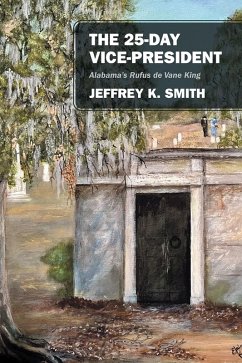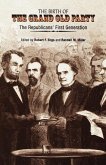"The 25-Day Vice-President: Alabama's William Rufus de Vane King" documents the life and times of an often overlooked 19th Century statesman. Born to wealth and privilege in North Carolina, King grew up to become an attorney and was elected by Tarheel voters to serve in the State Legislator and U.S. Congress.
In 1819, after serving in Europe as Legation Secretary for the American Foreign Minister to the Two Sicilies and Russia, King migrated to the Alabama Territory. He quickly became a prominent member of the territory's rapidly growing, slaveholding, planter-class aristocracy. As an established community leader, King helped construct a new city near his plantation home. Furthermore, he was credited with naming the community Selmz, in honor of a favorite Ossian poem.
After Alabama was admitted to the Union, King was elected as one of the 22nd state's first U.S. Senators. For nearly three decades, he served in the Senate representing his adopted home state. As a slaveholder, King believed perpetuation of the barbaric institution was a Constitutional right. Nonetheless, he never joined forces with the so-called "fire-eaters," rabid secessionists who advocated disunion if the federal government threatened to abolish slavery.
As a Moderate Democrat, King was a political conciliator rather than agitator. While serving in the U.S. Senate, he facilitated compromises between pro- and anti-slavery forces, temporarily forestalling inevitable secession and the bloody American Civil War. As a conciliator and compromiser, King was a political anomaly in the Deep South.
King died in March 1853, just 25 days after he was sworn into office as the 13th Vice-President of the United States, and eight years before the onset of the Civil War. Inaugurated while he was seeking treatment for terminal tuberculosis in the island nation of Cuba, King remains the first and only American President or Vice-President to take the oath of office on foreign soil.
King was no doubt an enigmatic figure. He was a respected statesman who vainly sought to save America from disunion. In his later years, he resigned from Congress to serve as Foreign Minister to France where he convinced the European power to refrain from interfering with America's Manifest Destiny expansionist agenda.
While mild-mannered and chivalrous, King was never a shrinking violet. On at least three separate occasions, he accepted challenges to participate in potentially deadly duels when his honor was called into question. As a lifelong bachelor, King was the target of unsubstantiated rumors and innuendo concerning his sexual orientation. Political enemies repeatedly proclaimed King was gay, derisively nicknaming him "Miss Fancy."
"The 25-Day Vice-President" is a compelling narrative. Much of William R. King's life journey unfolded during America's tumultuous Antebellum-era, when the nation was not yet a century-old. While slavery proved to be the most divisive issue, other controversies led to bitter disagreements and the formation of rival political parties.
Given the taboo nature of same-sex relationships in the 19th Century, King's private life is explored under a detailed and objective light. Readers will be challenged to judge whether individuals' personal and private choices detract from their accomplishments or meaningfully alter the historical record.
Undoubtedly, King is one of many lesser-known public figures who helped weave America's complex political and social fabric.
In 1819, after serving in Europe as Legation Secretary for the American Foreign Minister to the Two Sicilies and Russia, King migrated to the Alabama Territory. He quickly became a prominent member of the territory's rapidly growing, slaveholding, planter-class aristocracy. As an established community leader, King helped construct a new city near his plantation home. Furthermore, he was credited with naming the community Selmz, in honor of a favorite Ossian poem.
After Alabama was admitted to the Union, King was elected as one of the 22nd state's first U.S. Senators. For nearly three decades, he served in the Senate representing his adopted home state. As a slaveholder, King believed perpetuation of the barbaric institution was a Constitutional right. Nonetheless, he never joined forces with the so-called "fire-eaters," rabid secessionists who advocated disunion if the federal government threatened to abolish slavery.
As a Moderate Democrat, King was a political conciliator rather than agitator. While serving in the U.S. Senate, he facilitated compromises between pro- and anti-slavery forces, temporarily forestalling inevitable secession and the bloody American Civil War. As a conciliator and compromiser, King was a political anomaly in the Deep South.
King died in March 1853, just 25 days after he was sworn into office as the 13th Vice-President of the United States, and eight years before the onset of the Civil War. Inaugurated while he was seeking treatment for terminal tuberculosis in the island nation of Cuba, King remains the first and only American President or Vice-President to take the oath of office on foreign soil.
King was no doubt an enigmatic figure. He was a respected statesman who vainly sought to save America from disunion. In his later years, he resigned from Congress to serve as Foreign Minister to France where he convinced the European power to refrain from interfering with America's Manifest Destiny expansionist agenda.
While mild-mannered and chivalrous, King was never a shrinking violet. On at least three separate occasions, he accepted challenges to participate in potentially deadly duels when his honor was called into question. As a lifelong bachelor, King was the target of unsubstantiated rumors and innuendo concerning his sexual orientation. Political enemies repeatedly proclaimed King was gay, derisively nicknaming him "Miss Fancy."
"The 25-Day Vice-President" is a compelling narrative. Much of William R. King's life journey unfolded during America's tumultuous Antebellum-era, when the nation was not yet a century-old. While slavery proved to be the most divisive issue, other controversies led to bitter disagreements and the formation of rival political parties.
Given the taboo nature of same-sex relationships in the 19th Century, King's private life is explored under a detailed and objective light. Readers will be challenged to judge whether individuals' personal and private choices detract from their accomplishments or meaningfully alter the historical record.
Undoubtedly, King is one of many lesser-known public figures who helped weave America's complex political and social fabric.
Dieser Download kann aus rechtlichen Gründen nur mit Rechnungsadresse in A, D ausgeliefert werden.









